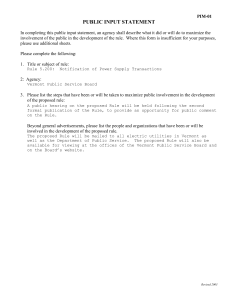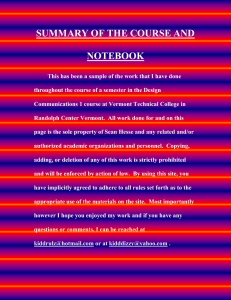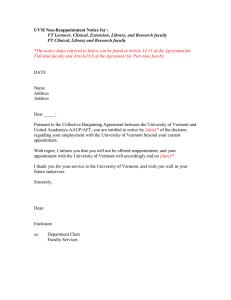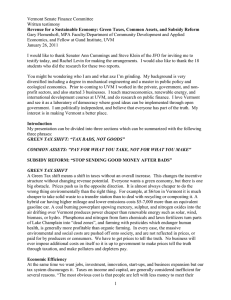Gary Flomenhoft, MPA Faculty/Department of Community Development and Applied
advertisement
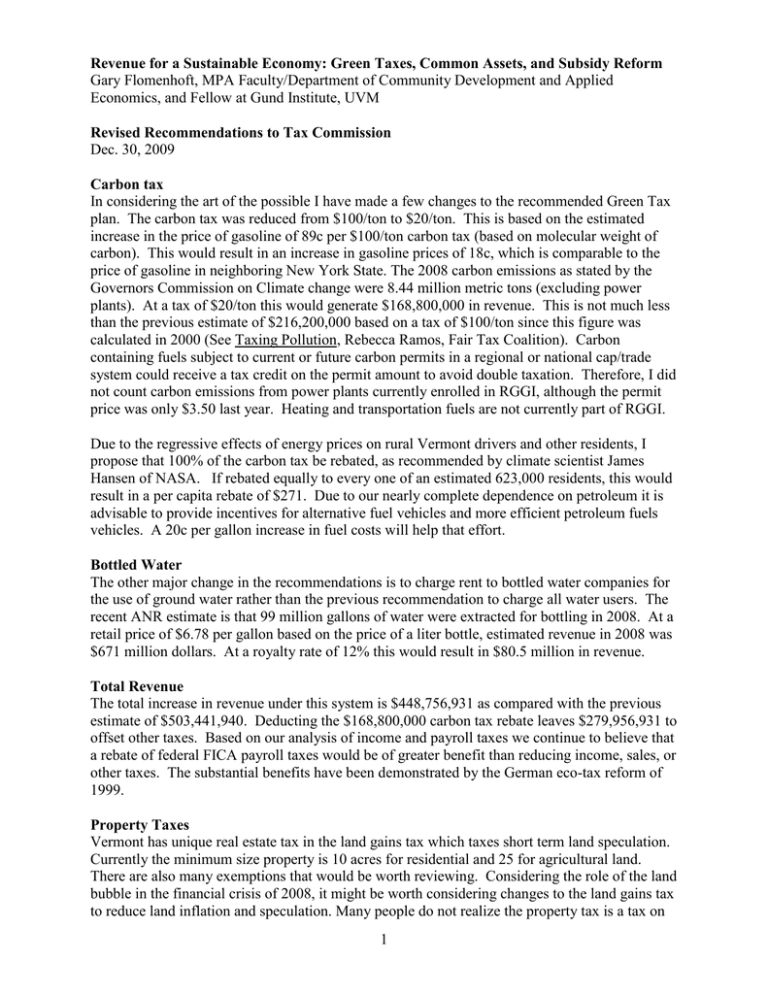
Revenue for a Sustainable Economy: Green Taxes, Common Assets, and Subsidy Reform Gary Flomenhoft, MPA Faculty/Department of Community Development and Applied Economics, and Fellow at Gund Institute, UVM Revised Recommendations to Tax Commission Dec. 30, 2009 Carbon tax In considering the art of the possible I have made a few changes to the recommended Green Tax plan. The carbon tax was reduced from $100/ton to $20/ton. This is based on the estimated increase in the price of gasoline of 89c per $100/ton carbon tax (based on molecular weight of carbon). This would result in an increase in gasoline prices of 18c, which is comparable to the price of gasoline in neighboring New York State. The 2008 carbon emissions as stated by the Governors Commission on Climate change were 8.44 million metric tons (excluding power plants). At a tax of $20/ton this would generate $168,800,000 in revenue. This is not much less than the previous estimate of $216,200,000 based on a tax of $100/ton since this figure was calculated in 2000 (See Taxing Pollution, Rebecca Ramos, Fair Tax Coalition). Carbon containing fuels subject to current or future carbon permits in a regional or national cap/trade system could receive a tax credit on the permit amount to avoid double taxation. Therefore, I did not count carbon emissions from power plants currently enrolled in RGGI, although the permit price was only $3.50 last year. Heating and transportation fuels are not currently part of RGGI. Due to the regressive effects of energy prices on rural Vermont drivers and other residents, I propose that 100% of the carbon tax be rebated, as recommended by climate scientist James Hansen of NASA. If rebated equally to every one of an estimated 623,000 residents, this would result in a per capita rebate of $271. Due to our nearly complete dependence on petroleum it is advisable to provide incentives for alternative fuel vehicles and more efficient petroleum fuels vehicles. A 20c per gallon increase in fuel costs will help that effort. Bottled Water The other major change in the recommendations is to charge rent to bottled water companies for the use of ground water rather than the previous recommendation to charge all water users. The recent ANR estimate is that 99 million gallons of water were extracted for bottling in 2008. At a retail price of $6.78 per gallon based on the price of a liter bottle, estimated revenue in 2008 was $671 million dollars. At a royalty rate of 12% this would result in $80.5 million in revenue. Total Revenue The total increase in revenue under this system is $448,756,931 as compared with the previous estimate of $503,441,940. Deducting the $168,800,000 carbon tax rebate leaves $279,956,931 to offset other taxes. Based on our analysis of income and payroll taxes we continue to believe that a rebate of federal FICA payroll taxes would be of greater benefit than reducing income, sales, or other taxes. The substantial benefits have been demonstrated by the German eco-tax reform of 1999. Property Taxes Vermont has unique real estate tax in the land gains tax which taxes short term land speculation. Currently the minimum size property is 10 acres for residential and 25 for agricultural land. There are also many exemptions that would be worth reviewing. Considering the role of the land bubble in the financial crisis of 2008, it might be worth considering changes to the land gains tax to reduce land inflation and speculation. Many people do not realize the property tax is a tax on 1 land and building improvements combined, and that in some locations these items are taxed separately. Our primary recommendation for property is to consider a revenue neutral shift by taxing land more and buildings less. It would be advisable to start with enabling legislation that would allow municipalities to use this option in designated “Growth Centers”, “Downtowns”, and “Village Centers”. It has similar results as a TIF, but without any loss of revenue. Capital Gains and Speculation taxes. Due to the financial crisis, there is considerable discussion of financial speculation taxes both at the national and international level. Prime Minister Gordon Brown of Great Britain and PM Nicolas Sarkozy of France have both proposed an international speculation tax of .25% as we previously recommended. In the US Congress Representative Peter DeFazio and Senator Tom Harkin have proposed a bill called "Let Wall Street Pay for Wall Street's Bailout Act of 2009” also based on a rate of .25%. If these measures do not pass, Vermont could consider a state financial speculation tax. The disadvantage of a federal tax is that Vermont does not receive any of the revenue. Capital gains taxes do not differentiate between productive investments in goods and services and gambling in financial securities or real estate. It would be beneficial to exempt the job producing investments from capital gains taxes and maintain them fully on speculative investments. Exemptions could include entrepreneuers, venture capital and angel funds, investments in IPOs and new stock offerings, small business loans, housing construction, or any other productive investment and not a paper profit with no equivalent good or service provided. These productive investments could also be exempted from any speculation tax imposed. State Bank One state that has emerged with minimal damage from the financial crisis is the state of North Dakota. In the early part of the 20th century, North Dakota farmers were squeezed financially by out-of-state bankers. Determined to avoid this loss of autonomy in the future, the state legislature created the Bank of North Dakota in 1919. All state funds and funds of state institutions are deposited with Bank of North Dakota, as required by law. The Bank administers several lending programs that promote agriculture, commerce and industry in North Dakota. Vermont would be well advised to follow the example of North Dakota and consider the formation of a Vermont Sovereign State Bank. In the case of a crisis due to the declining value of the US dollar, the state bank would be in a position to create bills of credit or state currency to maintain the operation of the state economy and state government. Revised summary of Green Tax shift measures: ITEM Carbon tax $20/ton Pay as you Throw Solid Waste $2/bag Bottlers-groundwater rent Property shift: 2/3 land, 1/3 buildings Chemicals Other new revenue TOTAL NEW REVENUE Carbon tax rebate Payroll tax rebate New Revenue $168,800,000 $149,103,672 $80,546,400 0 $2,215.900 $50,304,643.10 $448,756,931 $168,800,000 $279,956,931 2 Captive Insurance 1% Telephone Company 0% Bank Franchise 0% Insurance 1% Beverage 0% Tobacco Products 0% 2004-2009rev-w/offsets Other general taxes 0% Cigarette 2% Other fees 2% Telephone Property 0% Telecommunications 1% Corporate Income 2% TOTAL ENERGY 18% Total water 3% Meals & Rooms 4% TOTAL WASTE Sales & Use 10% TOTAL CHEMICALS Estate Tax 1% current use property 0% Current Use Penalty Tax 0% Personal Income 17% Speculative Gains Tax 0% land-NICU 20% eee property tax (PROP68) 0% Property Transfer Tax 1% buildingsNICU 2004-2009rebates $20/ton carbon tax rebate: $168,800,000=$27 1 each Fed Payroll tax rebate $280,000,000 3
